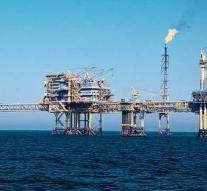
Fear of rapidly rising oil prices
- The oil sector represents the largest decrease in production capacity in thirty years. The buffer held by Opec countries is threatening to drop to 2% due to high demand, the bottom since 1984. In conflicts or production constraints, there is not much of a price increase.
This is what business bank Jefferies concludes on the basis of stock research in the run-up to the Opec meeting of 22 and 23 June in Vienna.
There the Opec member states are discussing how they can further balance their production with demand after the run-off since the beginning of last year. Worldwide, according to the oil cartel, it is one hundred million barrels per day.
The estimation of buffer capacity by Jefferies is not the most sharp, other investment banks think that the extra capacity for calamities can fall below 2%, with more price rises as a result. The stocks circulate around a five-year average.
The erratic price of Brent oil went to $ 80 a barrel due to falling stock. Saudi Arabia has traditionally played the role of 'swing producer', the Opec leader who tries to balance the market with big increases and decreases. It has indicated that it wants to get rid of that role.
The United States demands a lowering of the oil price. Washington has reportedly asked Opec for additional production of one million barrels per day.
Air companies and motorists also feel the pain of price increases of the world's most important raw material.
The block of fourteen countries produced 32 million barrels per day in April, a decrease of 140,000 barrels of counter-land in March. The April figure is approximately 730,000 barrels per day under the self-imposed ceiling of the Opec of 32.73 million barrels.
Opec is divided internally. Saudi Arabia would like to respond to Washington, also a major weapon supplier. Last month, the first production of ten million barrels per day was measured since October last year.
But Iran, which has been hit by the heaviest trade sanctions in the US, wants the cartel to give its third volume producer more room to raise the price. It feels that the call for a lower price is 'exaggerated' for the time being.
According to ING Research, Iran has clearly not complied with the Opec agreements in recent months. If Saudi Arabia pumped oil up to 300,000 barrels per day per day, it will stay within its agreements, according to ING.
According to oil supplier Eni in January, there is both a lack of stock and a buffer. 'In that situation, every geopolitical event can lead to a price increase. '
Opec, in reaction in Vienna, would propose to give members Venezuela, affected by great poverty, and Iran still the extra space to produce their income.
Tuesday afternoon, the American API reports its weekly production figures. Stocks there are expected to decrease by 1.5 million barrels on a weekly basis.
Energy agency EIA comes with a preview today for 2018 and 2019. The largest storage in Permian Base is due to a lack of truckers with delivery problems. This figure could also come under expectations.
ABN Amro concludes in a sector overview that the higher prices will 'not necessarily lead to new exploration and drilling activities' for Dutch companies in the offshore sector.
Also look at:

Leave a comment